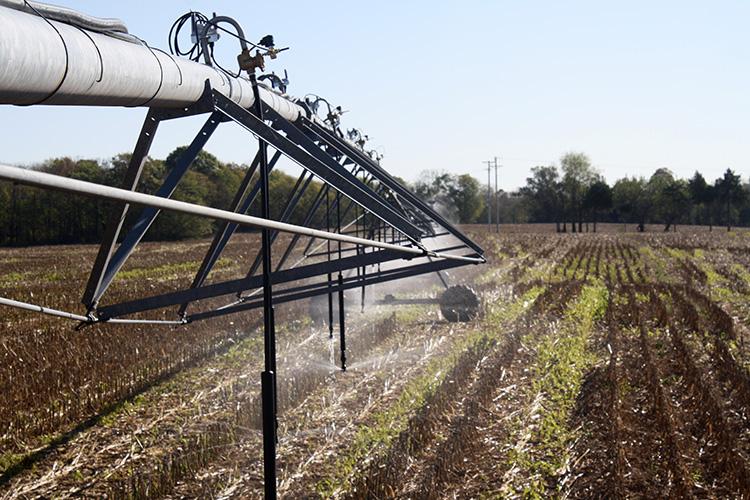UK begins on-farm variable rate irrigation research
UK begins on-farm variable rate irrigation research

To watch the video, click here.
A University of Kentucky research project that could have significant impacts for Kentucky grain producers with irrigated acres is beginning on a Western Kentucky farm.
Ole Wendroth, soil physicist in the UK College of Agriculture, Food and Environment, is leading a study examining the effects of a variable rate irrigation system that, to his knowledge, is the first-of-its-kind in the state.
“When we irrigate, we practice environmental stewardship,” said Wendroth, a professor in the UK Department of Plant and Soil Sciences. “Irrigation keeps the soil wet, which means plant roots better penetrate the soil and take up nutrients. This lowers the amount of nitrogen in the soil and reduces our risk of nitrate leaching during the winter, when we tend to have a lot of rainfall.”
Wendroth is conducting this research in partnership with Princeton farmer Trevor Gilkey at his Hillview Farms. The two men have worked together on various projects for more than 15 years, beginning with a variable rate nitrogen study.
“I’m interested in conserving water, preventing runoff and putting the water where we need it, especially when we have different soil types within the same field,” Gilkey said.
Historically, Kentucky farmers do not irrigate many acres compared to growers in drier climates. Often, the state receives adequate rainfall to produce a crop, but the rainfall does not always occur at the key growing times during the season, when crops need it the most. As a result, some producers have invested in irrigation over the past 20 years. This has created the need for research tailored to the state’s climate.
“While we only have a small percentage of producers who irrigate, those producers have many center pivots and would benefit from research to help them figure out scheduling, develop a better understanding of soil-crop interactions and determine the thresholds for water application,” said Carrie Knott, director of the UK Research and Education Center and one of Wendroth’s research collaborators. “We hope to answer these questions through research studies like this one.”
Gilkey’s field where the variable rate irrigation research is occurring is 137 acres and usually rotates between corn, wheat and double-crop soybeans. Not only does the field have Kentucky’s typical crop rotation, it also contains common soil types found in much of the state’s irrigated acres.
“Our mission at the UK Grain and Forage Center of Excellence is to help farmers be more efficient, improve productivity and preserve the natural resources that they have, and we believe that practicing smart irrigation is a step toward achieving those goals,” said Chad Lee, center director and a research collaborator with Wendroth. “We believe the results from this study will be applicable to most Kentucky farms with center pivots.”
Over the past five years, Wendroth and his graduate students have conducted extensive research on Gilkey’s farm. They have collected soil samples, identified soil fertility trends, created an intensive soil mapping system and developed what Wendroth believes is a variable irrigation prescription for the field. In this newest research project, Wendroth will be able to control the flow of water at each sprinkler.
“As scientists we need to develop a sense for spatial variability out in the landscape, which is what farmers have to deal with all the time,” Wendroth said. “If we know that water is not taken up by the soil at the same rate at different parts of the field, then we have to do something about it. We believe variable technology can work for us here.”
The project is an effort of the UK Grain and Forage Center of Excellence and has received overwhelming support from the state’s agricultural groups. It has received funding from the Kentucky Corn Growers, Kentucky Small Grain Growers, Kentucky Soybean Promotion Board, Southern Soybean Research Program, Kentucky Farm Bureau’s Water Quality Initiative and Siemer Milling Company.
Rebecca McCulley, chair of the Department of Plant and Soil Sciences, said it is scientist-farmer partnerships like the one Gilkey and Wendroth have that help advance agricultural science and improve farming practices.
“To be able to take concepts that we develop in the lab and actually bring them into the field helps us to understand what pieces of our science we have right and what pieces are still a long ways from being right,” she said. “These partnerships are critical to be able to make sure we are spending time on the research side that is going to be translatable to people in the field doing the work.”
Plant & Soil Sciences Research


